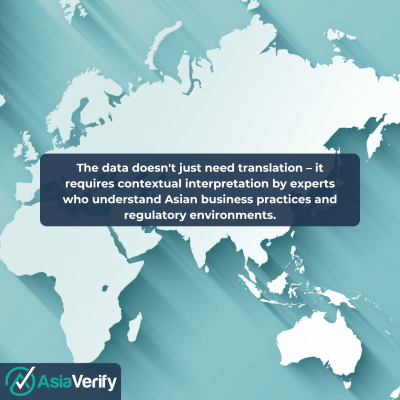A conversation with Ficoal (Founder & CPO) and Kurtis (Data Product Lead), AsiaVerify
As Artificial intelligence (AI) continues to reshape finance, it is no surprise that its impact in the next decade is key focus at Singapore FinTech Festival (SFF) 2025. For RegTech innovators like AsiaVerify, this discussion couldn’t be more pertinent. The main challenge now is how AI-enabled solutions are adopted when accuracy, accountability, and trust cannot be compromised.
As SFF 2025 brings together global leaders to explore the future of responsible innovation, we revisit a conversation with Ficoal Dong, Founder and Chief Product Officer, and Kurtis Ma, Data Product Lead at AsiaVerify. In this Q&A, they offer insights on how AI can advance compliance not only through automation but also via transparency, data integrity, and human oversight.
“Without the right foundation, AI becomes little more than a guessing game. Compliance is not the place for trial and error.” – Ficoal Dong
The Dangers of Rushing In
While many in the industry were quick to implement generic models trained on open internet data, this approach raises significant concerns. Such data often lacks proper context, is not verified, and may introduce risk when applied to compliance workflows.
AsiaVerify Pulse recently spoke to Ficoal Dong, Founder and Chief Product Officer of AsiaVerify and Kurtis Ma, Data Product Lead about building AI tools for compliance and the inherent broader responsibility that comes with it.
AsiaVerify Pulse: Why is now the right time for RegTech to embrace AI, and what risks do you foresee in moving too quickly or carelessly?
Ficoal: Yes, I believe this is exactly the right time. AI has matured significantly over the past few years, and RegTech providers like AsiaVerify have now accumulated the right combination of deep domain expertise and high-quality, structured data, particularly in the APAC region. That foundation is essential. Without it, AI solutions risk being inaccurate or even misleading. The biggest danger is jumping in too quickly with poor data quality or using off-the-shelf AI tools without domain context. In compliance, this can’t be treated like a tech experiment—there’s no room for “garbage in, garbage out.”
Kurtis: The tools we build influence whether a business can open a bank account, whether a partner can be onboarded, or whether a transaction goes ahead. These are not abstract ideas. They affect real people and real companies. It is not about being first to market. It is about being precise, reliable and aligned with the needs of compliance professionals. Taking the time to get it right matters more than speed when accuracy and accountability are at stake.
AsiaVerify Pulse: How do you define “trust” when using AI in compliance, and how does AsiaVerify integrate that into its culture and product approach?
Ficoal: Trust in AI for compliance starts with data quality. If the data isn’t reliable, nothing else matters. Once the input is solid, the next layer is ensuring that the AI processes are explainable and auditable. At AsiaVerify, we’ve built our systems to empower compliance teams—not replace them. We use AI to automate data gathering and structuring, but the final decisions, especially in edge cases, always involve human review. This human-in-the-loop model avoids automation bias and ensures the right judgment is applied where needed.
Kurtis: Another way to think about this is that we don’t use AI to make the final call. In compliance, being accurate matters more than being fast. So we use AI to flag issues or add context, but everything still ties back to real registry data. If it can’t be verified, we don’t rely on it.
“It’s not enough to build something that works. It must be built on strong foundational data, with transparency and accountability at its core.” – Kurtis Ma
AsiaVerify Pulse: What responsibility do RegTech providers hold in shaping the ethical use of AI in financial compliance?
Ficoal: We carry a significant responsibility. Compliance decisions directly affect financial inclusions, risk exposure, and legal obligations. As RegTech providers, we must ensure that our AI systems are:
- Accurate – based on trusted, verified data.
- Unbiased – trained on diverse datasets that reflect real-world variation.
- Explainable – capable of showing how and why a decision was made.
- Auditable – with clear logs for every AI-driven outcome.
It’s not just about building smart tools—it’s about building tools that regulators and compliance professionals can trust and defend.
Kurtis: Compliance is about proof and accountability. AI is useful for spotting missing info or weird patterns in big datasets, but it doesn’t replace the need for actual, trusted sources. The compliance community can lead by example as businesses race to apply AI.
AsiaVerify Pulse: Have you had to make a difficult decision about whether to use AI in a specific product feature? What influenced that decision?
Ficoal: Yes—one key example was in using LLMs (large language models) to summarise KYB and UBO reports. Many market solutions apply generic LLMs to internet data, which is often unverified or out of context. That creates a serious reliability problem, especially in regulated environments. We chose not to follow that trend blindly. Instead, we only deployed LLM summarisation after integrating it with our official registry-based KYB/UBO data and proprietary UBO ownership algorithms. This combination gives us both the power of AI and the trust of structured, regulated data—so it becomes a real compliance tool, not just a generative feature.
Kurtis: One challenge we have is the technical or data limitations that are often overlooked when applying AI to compliance in Asia-Pacific markets. Getting good, clean registry data is still hard in this region. You’ve got language differences, inconsistent formats, and data scattered across systems. LLMs can help fill the gaps, but if the base data is messy, the results won’t be solid. I’m sure you’ve heard about how hard it’s got to get data quick in Indonesia or Philippines, and that’s due to rather dated infrastructure and physical documents that need to be handled.
“The winners in this space will be the ones who use AI to make things clearer, not more confusing.” – Ficoal Dong
AsiaVerify Pulse: Looking ahead two to three years, what do you think will distinguish RegTech firms that effectively utilise AI from those that merely follow the trend?
Kurtis: Those that build with grounded data first. We focus on combining official registry data and supplement it with supplementary information from LLMs to enrich understanding, not replace fact. The goal is to deliver verified data that compliance teams can actually rely on, supplemented with AI to aid understanding.
Ficoal: That’s right, Kurtis. The real differentiator will be in delivering clarity, simplicity, and trust. True innovators will use AI to make RegTech products easier to use and more reliable—not more complex. For providers, AI will help automate and scale core capabilities. For users, the experience will become smoother and more transparent. The successful firms won’t just add AI for show—they’ll build solutions that are truly compliant, explainable, and aligned with real-world needs in financial services.
Moving Forward with a Purpose
At AsiaVerify, progress is guided by purpose. That means building on a foundation of trusted data, designing with transparency in mind, and keeping people at the centre of every decision. By taking a measured, principle-led approach, we ensure AI supports the real-world demands of modern compliance.
This November, AsiaVerify will be at Singapore FinTech Festival 2025 (12–14 November), where we will demonstrate how AI and verified data can work together to build trust, efficiency, and inclusion across borders.
Visit us at Booth 4H10 to see how our award-winning, AI-powered UBO mapping brings this vision to life, helping financial institutions and compliance teams uncover cross-border ownership networks across Asia, more quickly and with greater confidence.







